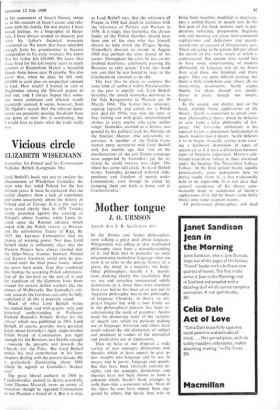Vicious circle
ELIZABETH WISKEMANN
Gomulka: his Poland and his Communism Nicholas Bethell (Longmans 50s)
Lord Bethell's book sets out to analyse the phenomenon of Wladyslaw Gomulka, the man who has ruled Poland for the last thirteen years. It must be confessed that the earlier chapters show a lack of experience and some uncertainty about the history of Poland and of Europe. It is a pity not to have stated clearly that in 1920 Trotsky wisely protested against the crossing of Poland's ethnic frontier, while Lenin in- sisted upon the Russian advance which ended with the Polish victory at Warsaw and the unfortunate Treaty of Riga. By 1925 the German Communists had no chance of winning power. Nor does Lord Bethell make it sufficiently clear that the Western Powers have always insisted that the Oder-Neisse frontier between Poland and Eastern Germany could only be pro- visional until the final peace treaty, which has never been made. True they condoned this frontier by accepting Polish administra- tion of the territory to the east of it and the expulsion of the Germans from there (except for certain skilled workers like the miners of Walbrzych). But Gomulka's atti- tude towards the Germans can only be fully explained if all this is precisely stated.
Much of what Lord Bethell writes has indeed been said with greater style and historical understanding in Professor Richard Hiscock's Poland: Bridge for the Abyss? which was published in 1963. Lord Bethell, of course, provides more personal detail about Gomulka's rigid, single-minded Polish brand of Communism, just rigid enough for the Russians, just flexible enough —towards the peasants and towards the Church—for the Poles. But Lord Bethell makes his real contribution in his later chapters dealing with the present decade. He is particularly illuminating about 1968 which he regards as Gomulka's 'darkest year'.
The great liberal outburst in 1968 in Czechoslovakia seemed to derive essentially from Thomas Masaryk, never an enemy a Socialism though he regarded Communism as too Prussian a brand of it. But it is true,
as Lord Bethell says, that the reformers of Prague in 1968 had much in common with the reformers of Poznan and Warsaw in 1956. It is tragic that Gomulka, the chosen leader of the Polish October, should have been one of the men who has himself chosen to help crush the Prague Spring. `Gomulka's decision to invade in August 1968 was perhaps the most dismal of his career. Throughout the crisis he was an un- doubted hard-liner, continually pressing the Russians to take action.' From this book one sees that he was bound to react to the Czechoslovak situation as he did.
The fact that he chose to suppress the same kind of outburst within Poland earlier in the year is equally sad. Lord Bethell describes the speech Gomulka delivered in the Sala Kongresowa in Warsaw on 19 March, 1968. 'The former fiery reformer, arguing logically and calmly for a Polish new deal (in 1956), was now the ruler at bay, lashing out with great, uncoordinated strokes at every enemy who came within range.' Gomulka, married to a Jewess, was goaded by his political rival, his Minister of the Interior, Moczar, into anti-semitic re- pression. A member of the Polish Com- munist party secretariat told Lord Bethell only five months ago that 'not all the manifestations of the anti-Zionist campaign were supported by Gomulka', yet the re- straint he could exercise was slight. The wheel has come full circle. As Lord Bethel! writes, `Gomulka pioneered national inde- pendence and freedom of speech under Communism, even though he ended by stamping them out both at home and in Czechoslovakia.'


































 Previous page
Previous page